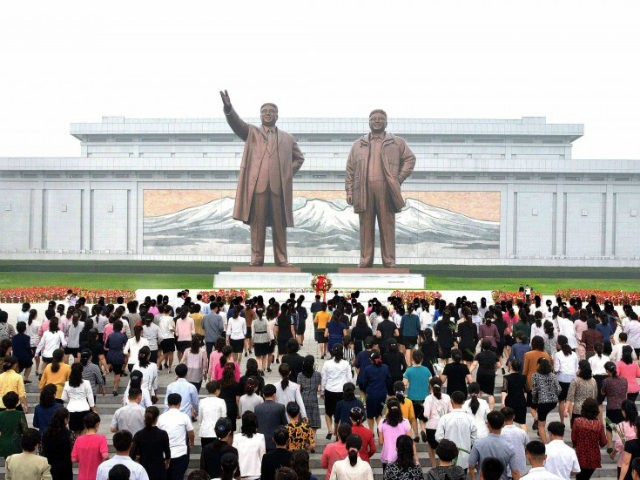North Korea’s communist regime announced Monday that beginning August 1, it would enact a general amnesty for “those who had been convicted of the crimes against the country and people.”
The state-run Korean Central News Agency (KCNA) did not specify what kind of crimes the regime would forgive or how many people will be affected by the amnesty. Human rights organizations estimate that more than 100,000 people are currently toiling in concentration camps throughout the country, including those convicted of crimes against the state as well as their families–some born in the labor camps and never allowed out.
North Korea imposes a strict caste system known as songbun. If an individual is found guilty of disagreeing with the repressive Kim regime in any way, both that individual and the entire family loses its songbun. It takes several generations for a family to slowly rebuild its status. Families with low songbun may not have access to food, shelter, or water, and most are not allowed in the capital, Pyongyang.
The KCNA announcement, if true, may signal an attempt to appease human rights activists who insist that any growing ties between North Korea and the free should require dictator Kim Jong-un to abandon the ruthlessness that has characterized the cult he has led since his father, Kim Jong-il, died in 2011.
“The DPRK [Democratic People’s Republic of Korea] will grant an amnesty to those who had been convicted of the crimes against the country and people on the occasion of the 70th founding anniversary of the DPRK,” KCNA announced Monday, adding that those affected will be freed on August 1. It also added that the government would provide programs to rehabilitate those imprisoned and “help the released people settle down to normal working life” and explained:
It is the intrinsic demand of Korean-style socialist system and the consistent principle of state activities to protect the independent and creative life of the popular masses and make selfless, devoted efforts for them by thoroughly applying the people-first principle, the most vivid expression of the Juche-oriented view on the people and people-centered philosophy.
As the South Korean news outlet Yonhap noted, the amnesty is being presented as a gesture of goodwill to celebrate the 70th anniversary of the founding of North Korea. Outside of that, however, the country provided few details. “Crimes against the state” is an extremely wide category of crimes that may include both conventional crime and political disagreements, and many of those imprisoned in labor camps have not been convicted of crimes outside of being related to convicts.
Yonhap added that this amnesty is not unprecedented. Kim Jong-un issued a similar decree in 2012, which appears to have had little effect on the population of the nation’s many labor camps. Kim also claimed to have enacted a special amnesty for arrested officers and shut down a concentration camp, though no evidence exists that any of these promises were kept.
As of this year, human rights advocates believe that North Korea profits to the tune of $2-3 billion a year from forced labor, both in labor camps and in selling labor to foreign countries like China, or sending specialized workers to run tourist restaurants around the world. The Committee for Human Rights in North Korea, citing satellite evidence and testimony from eyewitnesses, estimated that up to 120,000 people are currently living in North Korea’s labor camps and that at least 400,000 have died there. A recent U.S. State Department report listed among those who may find themselves in a North Korean labor camp “officials perceived to have performed poorly in their job, people who have criticized the regime, and anyone suspected of engaging in anti-government activities.”
Aside from routine torture and excessive labor, “induced starvation is common among prisoners, who are driven to catch and eat rodents, frogs, and snakes,” the State Department noted.
The announced August amnesty contradicts the stern tone out of Pyongyang against any human rights reforms. As recently as last week, the state newspaper Rodong Sinmun demanded the United States “kick aside its anachronistic human rights pressure play that provokes the opposing party.”
“The plot to create disturbances with human rights toward [North Korea] is a challenge to our efforts at peace, which is bringing an end to the Cold War and contributing to the security of the region and the world,” the newspaper declared.
The week before that, another government publication, the Uriminzokkiri website, complained that the United States had continued with “the anachronistic human rights racket” in recent talks, an allegedly unacceptable slight.

COMMENTS
Please let us know if you're having issues with commenting.